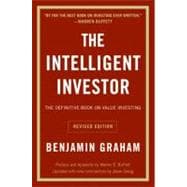The best book on investing ever written, this classic work offers sound and safe principles for investing - principles that have worked for more than the half century since the first edition was published.
This revised edition features a new introduction, appendix and chapter updates. Since its original publication in 1949, Benjamin Graham's book has remained the most respected guide to investing, due to his timeless philosophy of 'value investing', which helps protect investors against areas of possible substantial error and teaches them to develop long-term strategies with which they will be comfortable down the road.
“By far the best book on investing ever written.” - Warren Buffett
“If you read just one book on investing during your lifetime, make it this one” - Fortune
“The wider Mr. Graham’s gospel spreads, the more fairly the market will deal with its public.” - Barron's








